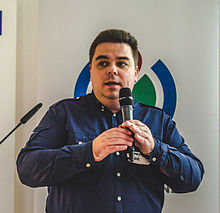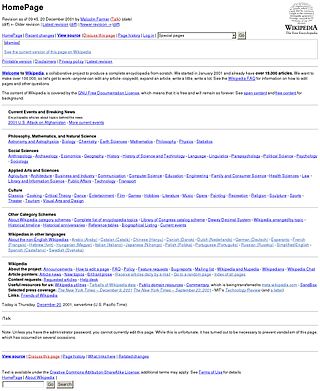
Wikipedia, a free-content online encyclopedia written and maintained by a community of volunteers known as Wikipedians, began with its first edit on 15 January 2001, two days after the domain was registered. It grew out of Nupedia, a more structured free encyclopedia, as a way to allow easier and faster drafting of articles and translations.

A wiki is a form of online hypertext publication that is collaboratively edited and managed by its audience directly through a web browser. A typical wiki contains multiple pages that can either be edited by the public or limited to use within an organization for maintaining its internal knowledge base.

MediaWiki is a free and open-source wiki software originally developed by Magnus Manske for use on Wikipedia on January 25, 2002, and further improved by Lee Daniel Crocker, after which it has been coordinated by the Wikimedia Foundation. It powers several wiki hosting websites across the Internet, as well as most websites hosted by the Wikimedia Foundation including Wikipedia, Wiktionary, Wikimedia Commons, Wikiquote, Meta-Wiki and Wikidata, which define a large part of the set requirements for the software. MediaWiki is written in the PHP programming language and stores all text content into a database. The software is optimized to efficiently handle large projects, which can have terabytes of content and hundreds of thousands of views per second. Because Wikipedia is one of the world's largest and most visited websites, achieving scalability through multiple layers of caching and database replication has been a major concern for developers. Another major aspect of MediaWiki is its internationalization; its interface is available in more than 400 languages. The software has more than 1,000 configuration settings and more than 1,800 extensions available for enabling various features to be added or changed. Besides its usage on Wikimedia sites, MediaWiki has been used as a knowledge management and content management system on websites such as Fandom, wikiHow and major internal installations like Intellipedia and Diplopedia.
In genetics, an expressed sequence tag (EST) is a short sub-sequence of a cDNA sequence. ESTs may be used to identify gene transcripts, and were instrumental in gene discovery and in gene-sequence determination. The identification of ESTs has proceeded rapidly, with approximately 74.2 million ESTs now available in public databases. EST approaches have largely been superseded by whole genome and transcriptome sequencing and metagenome sequencing.

The Wellcome Sanger Institute, previously known as The Sanger Centre and Wellcome Trust Sanger Institute, is a non-profit British genomics and genetics research institute, primarily funded by the Wellcome Trust.

Jimmy Donal "Jimbo" Wales, is an Internet entrepreneur, webmaster, and former financial trader. He is a co-founder of the non-profit free encyclopedia, Wikipedia, and the for-profit wiki hosting service Fandom. He has worked on other online projects, including Bomis, Nupedia, WikiTribune, and WT Social.
Rfam is a database containing information about non-coding RNA (ncRNA) families and other structured RNA elements. It is an annotated, open access database originally developed at the Wellcome Trust Sanger Institute in collaboration with Janelia Farm, and currently hosted at the European Bioinformatics Institute. Rfam is designed to be similar to the Pfam database for annotating protein families.
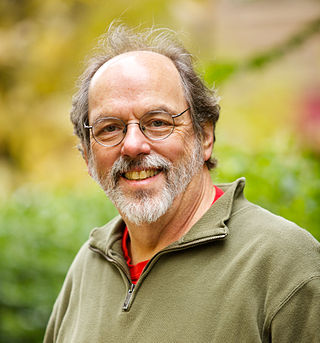
The history of wikis began in 1994, when Ward Cunningham gave the name "WikiWikiWeb" to the knowledge base, which ran on his company's website at c2.com, and the wiki software that powered it. The wiki went public in March 1995, the date used in anniversary celebrations of the wiki's origins. c2.com is thus the first true wiki, or a website with pages and links that can be easily edited via the browser, with a reliable version history for each page. He chose "WikiWikiWeb" as the name based on his memories of the "Wiki Wiki Shuttle" at Honolulu International Airport, and because "wiki" is the Hawaiian word for "quick".

Bomis, was a dot-com company best known for supporting the creations of free-content online-encyclopedia projects Nupedia and Wikipedia. It was co-founded in 1996 by Jimmy Wales, Tim Shell, and Michael Davis. By 2007, the company was inactive, with its Wikipedia-related resources transferred to the Wikimedia Foundation.
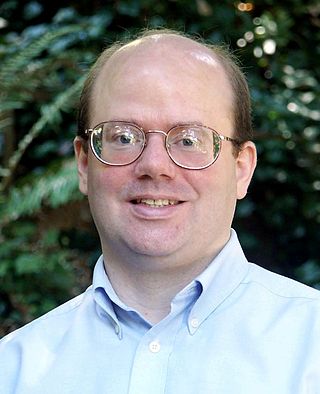
Lawrence Mark Sanger is an American Internet project developer and philosopher who was the editor-in-chief of Nupedia, an online encyclopedia, and co-founded its successor Wikipedia along with Jimmy Wales. He coined Wikipedia's name, and provided initial drafts for many of its early guidelines, including the "Neutral point of view" and "Ignore all rules" policies. He later worked on other encyclopedic projects, including Encyclopedia of Earth, Citizendium, and Everipedia, and advised the nonprofit American political encyclopedia Ballotpedia.
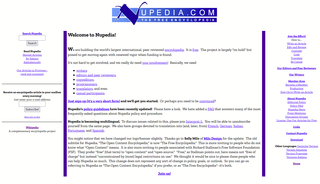
Nupedia was an English-language online encyclopedia whose articles were written by volunteer contributors with relevant subject matter expertise, reviewed by expert editors before publication, and licensed as free content. It was founded by Jimmy Wales and underwritten by Bomis, with Larry Sanger as editor-in-chief. Nupedia operated from October 1999 until September 2003. It is best known today as the predecessor of Wikipedia. Nupedia had a seven-step approval process to control content of articles before being posted, rather than live wiki-based updating. Nupedia was designed by a committee of experts who predefined the rules. It had only 21 articles in its first year, compared with Wikipedia having 200 articles in the first month, and 18,000 in the first year.

In molecular biology and genetics, DNA annotation or genome annotation is the process of describing the structure and function of the components of a genome, by analyzing and interpreting them in order to extract their biological significance and understand the biological processes in which they participate. Among other things, it identifies the locations of genes and all the coding regions in a genome and determines what those genes do.
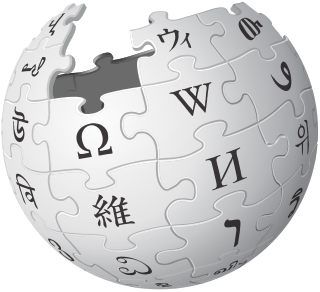
The following outline is provided as an overview of and a topical guide to Wikipedia:

BlueSpice is free wiki software based on the MediaWiki engine and licensed with the GNU General Public License. It is especially developed for businesses as an enterprise wiki distribution for MediaWiki and used in over 150 countries.
Single nucleotide polymorphism annotation is the process of predicting the effect or function of an individual SNP using SNP annotation tools. In SNP annotation the biological information is extracted, collected and displayed in a clear form amenable to query. SNP functional annotation is typically performed based on the available information on nucleic acid and protein sequences.

Alexander George Bateman is a computational biologist and Head of Protein Sequence Resources at the European Bioinformatics Institute (EBI), part of the European Molecular Biology Laboratory (EMBL) in Cambridge, UK. He has led the development of the Pfam biological database and introduced the Rfam database of RNA families. He has also been involved in the use of Wikipedia for community-based annotation of biological databases.
Transcriptomics technologies are the techniques used to study an organism's transcriptome, the sum of all of its RNA transcripts. The information content of an organism is recorded in the DNA of its genome and expressed through transcription. Here, mRNA serves as a transient intermediary molecule in the information network, whilst non-coding RNAs perform additional diverse functions. A transcriptome captures a snapshot in time of the total transcripts present in a cell. Transcriptomics technologies provide a broad account of which cellular processes are active and which are dormant. A major challenge in molecular biology is to understand how a single genome gives rise to a variety of cells. Another is how gene expression is regulated.

Dominic Kwiatkowski was an English medical researcher and geneticist who was head of the parasites and microbes programme at the Wellcome Sanger Institute in Cambridge and a Professor of Genomics at the University of Oxford. Kwiatkowski applied genomics and computational analysis to problems in infectious disease, with the aim of finding ways to reduce the burden of disease in the developing world.
